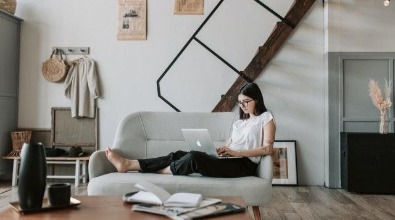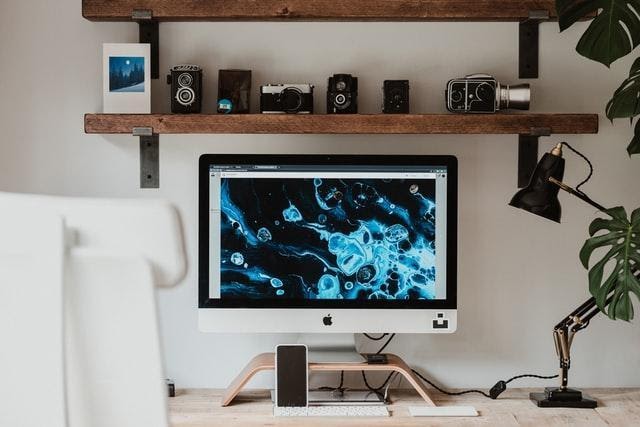6 Tips for Creating a Productive Workspace in Your Small Apartment
6 Tips for Creating a Productive Workspace in Your Small Apartment
By Jessie Ochoa

With remote work becoming the standard, finding a way to tuck in an office area became one of the biggest small living woes. Sure, the available square footage may restrict your design ideas, bu couches and kitchen counters don’t actually count as home offices. The truth is, you don’t have to settle for a makeshift workspace that altogether forgoes both function and comfort. With just a bit of forethought, imagination, and the legwork we’ve done to help get you started, creating a productive workspace in your small apartment is more than possible.
Choose a place to set up
Making the best of your work-from-home situation starts with finding a spot in your small apartment to set up a functional home office. And , if you don’t think that you have enough room for a home office, chances are that you do (although it might take a bit of compromising with some other spaces).

Bedroom â€" One-bedroom apartments allow you to integrate your office area in the bedroom. With your desk up against the wall, instead of impeding the room, it will provide a rather cohesive look. If the bedroom space is too petite for a full-size desk, try placing a smaller one next to your bed so that it doubles as a nightstand.
Living room â€" If you don’t have a spare room, work with the space you do have. Try transforming a console table in your living room into a desk or utilizing the dead space behind your floating sofa to park a narrower desk.
Entryway â€" Try maximizing the space of your entryway, and then turn it into a tiny office by exchanging your console table for a bar-height one. Then, either add a bar stool or use it as a standing desk.
An awkward nook â€" Random alcoves or awkward corners in your home that you have absolutely no idea what to do with can provide a perfect opportunity for you to tuck in your small office space.
A wall-mounted shelf â€" Hanging a floating shelf on a wall and using it as a desktop will work perfectly for any small apartment design. Just make sure to hang one with enough depth to hold your laptop.
Under the stairs â€" That open slice of space underneath your staircase is just the right size to sneak in a tiny home office nook.
A pass-through space â€" Any pass-through space or a free wall with no specific purpose will do.
Tailor the space to your work needs
While picking out a spot to set up a small office area in your apartment, you’ll need to assess your work needs. Consider the kind of work you’ll be doing, how much space you’ll need, and what tools, materials, or appliances you’ll use. Only after you’ve answered these questions can you know the measurements of your desk, the size of the necessary storage space, and eventually, the right spot for creating a productive workspace in your small apartment.
Do you need more desktop space, but have no room to fit a large desk? Consider some space-saving hacks, such as wall-mounting the monitor of your computer. Do you want to separate your work life from your personal life, but your limited square footage doesn’t allow you to create a distinct workspace? Use a curtain or a folding screen to visually carve out the working nook. Is the laptop the only thing you need for work? Buy a smaller workstation that won’t overwhelm your small living space.

Create a workspace you’ll love
Decide on a design that suits your style. Options are numerous: modern, mid-century , rustic, industrial, minimalist, glam, traditional, or you can choose to play with a few different ones.
Secondly, bear in mind that color palettes are packed with the potential for boosting one’s mood and overall productivity. They can help you accentuate a sense of cohesiveness, happiness, and warmth. Even if your home office is not a separate room, you can add an accent color to the wall where your desk is to make things less uniform-looking.
Create a workspace you’ll love
Decide on a design that suits your style. Options are numerous: modern, mid-century , rustic, industrial, minimalist, glam, traditional, or you can choose to play with a few different ones.
Secondly, bear in mind that color palettes are packed with the potential for boosting one’s mood and overall productivity. They can help you accentuate a sense of cohesiveness, happiness, and warmth. Even if your home office is not a separate room, you can add an accent color to the wall where your desk is to make things less uniform-looking.
Green hues are soothing and easy on the eye, blueish shades stimulate the mind, warm neutrals produce a calming effect by keeping your stress levels down, yellow inspires creativity, etc. Naturally, this varies from one individual to another. The important thing is to choose colors and patterns that keep you motivated, calm, comfortable, and happy. Also, there are many other elements you can implement to create a personalized environment that inspires productivity. For instance, choose a piece of art you enjoy looking at, a type of wood for your desk you’ll love working on, a small area rug to keep your feet warm, some greenery to add that natural, organic vibe, etc.
Keep everything organized
Once you set up your home workstation, it’s time to make it work for you. By finding an effective mode of organization, you are bound to minimize your stress level, keep your thought stream driven, and increase your overall productivity.
Purge your workspace of all non-essentials and reserve the desktop only for the supplies you use every day.
Get cable organizers or a technology box to keep those cords and wires controlled and out of the way.
Choose a filing method that works best for you and your compact space, or opt for digitizing most of your paperwork.
Use jars, bins, trays, drawer dividers, binders to control any clutter and store your office supplies.
Use the full height of the wall
Avoid relying solely on your floor space for storage. Instead, keep everything you need at arm’s reach by installing shelving directly above your desk. You can use these shelves to hold important files, as well as stashes of pens, books, and other various office necessities. In case your rental lease agreement keeps you from nailing the whole construction into the wall, think about buying a free-standing ladder desk with vertical shelves.

Of course, shelving is not the only solution. There are many storage solutions for small apartments, such as the space underneath your desk, finding a desk with installed drawers.
Think ergonomically
Lastly, let’s talk about ergonomics! Having an ergonomic workspace means looking after your physical and mental well-being. With your body aligned and supported properly, you avoid back and neck pains, unnecessary eye strain, headaches, and repetitive stress injury. Consequently, you’ll experience a substantial boost in productivity and need fewer breaks. We’ve already spoken about decluttering, as it seems to be the number one step in most makeovers. Start by removing all excess, then limit the personal belongings you keep on your desk, and categorize each zone to suit different purposes (the extra vertical storage will help).
Next, adjust the height of your desk at 25 to 27.5 inches (depending on your height) so that your underarms and elbows lie straight on the surface of the table. You can purchase a desk riser if the desk is too low, as it is a great way to keep your keyboard and screen at comfortable levels. Also, upgrading to a comfortable chair that properly supports your lower back is vital in avoiding needless straining and leaning. Additionally, consider adding lumbar support to fill in the gap between the chair and your back.
The last thing you need for creating a productive workspace in your small apartment is to improve your available light. Add proper lighting by picking out a desk lamp with light that mimics natural light and, if possible, has an adjustable dimmer.
About the Author
Jessie Ochoa, a born and bred New Yorker, has been writing articles for many moving companies, such as Best Movers NYC. Combining his own experience of small living with the collective experience of COVID-19 ushering in the new age of remote working, he has been able to help people moving into small apartments make the best of their novel WFH situation.